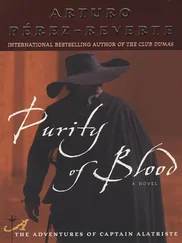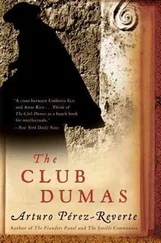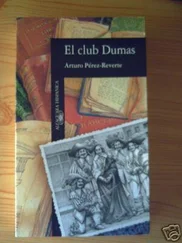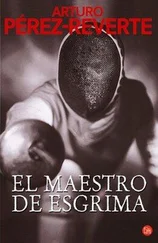I also visited the Alcaicería, the old silk market, an area full of shops selling rich merchandise and jewels. I was wearing black breeches and soldiers’ gaiters, a leather belt with a dagger stuck in it at the back, a military-style jerkin over my much-darned shirt, and on my head a very elegant cap of Flemish velvet—the spoils of war from what were fast becoming “the old days.” That and my youth both favored me, I think, and adopting the air of a battle-hardened veteran, I idled along past the swordsmiths’ shops in Calle de la Mar and Calle de Vizcaínos, or past the braggarts, doxies, and pimps in Calle de las Sierpes, opposite the famous prison behind whose black walls Mateo Alemán had languished and where good don Miguel de Cervantes had also spent some time. I swaggered past the legendary steps of the Cathedral—that cathedral of villainy—teeming with sellers, idlers, and beggars with signs hanging around their necks and displaying wounds and deformities, each one falser than a Judas kiss, as well as people who had been crippled on the rack but claimed to have been wounded in Flanders and who sported real or fake amputations, which they attributed to days spent fighting in Antwerp or Mamora but which could as easily have been acquired at Roncesvalles or at Numantia, for one had only to look them in the face, these men—who claimed to have won their scars for the sake of the true religion, king, and country—to know that the closest they had come to a heretic or a Turk was from the safety of the audience at the local playhouse.
I ended up outside the Reales Alcázares, staring up at the Hapsburg flag flying above the battlements, and at the imposing soldiers of the king’s guard armed with halberds and standing at attention at the great gate. I wandered around there for a while, amongst the citizens eager to catch a glimpse of the king or queen, should they chance to enter or leave. And when the crowd, and I with them, happened to move too close to the entrance, a sergeant in the Spanish guard came over to tell us very rudely to leave. The other onlookers obeyed at once, but I, being my father’s son, was piqued by the soldier’s bad manners, and so I dawdled and lingered with a haughty look on my face that clearly nettled him. He gave me a shove, and I—for my youth and my recent experience in Flanders had made me prickly on such matters—thought this the act of a scoundrel, and so I rounded on him like a fierce young hound, my hand on the hilt of my dagger. The sergeant, a burly, mustachioed type, roared with laughter.
“Oh, so you fancy yourself a swashbuckler, do you?” he said, looking me up and down. “Aren’t you a little young for that, boy?”
I held his gaze, shamelessly unashamed and with the scorn of a veteran, which despite my youth, I was. This fat fool had spent the last two years eating hot food and strolling about royal palaces and fortresses in his red-and-yellow-checkered uniform, while I had been fighting alongside Captain Alatriste and watching my comrades die in Oudkerk, at the Ruyter mill, in Terheyden, and in the prison cells of Breda, or else foraging for food in enemy territory with the Dutch cavalry at my back. How very unfair it was, I thought, that human beings did not carry their service record written on their face. Then I remembered Captain Alatriste, and I said to myself, by way of consolation, that some people did. Perhaps one day, I thought, people will know or guess what I have done simply by looking at me, and then all these sergeants, fat or thin, whose lives have never depended on their sword, would have to swallow their sarcasm.
“I may be young, but my dagger isn’t,” I said resolutely.
The other man blinked; he had not expected such a riposte. I saw that he was taking a closer look at me. This time he noticed that I had my hand behind me, resting on the damasked hilt of my knife. Then he gazed dumbly into my eyes, incapable of reading what was in them.
“A pox on’t, why I’ll . . . ”
The sergeant was fuming, and it certainly wasn’t incense issuing forth from him. He raised his hand to slap me, which is the most unacceptable of offenses—in the olden days, one could only slap a man who wasn’t dressed in the knightly uniform of helmet and coat of mail—and I said to myself, “I’m done for. Avenging every little slight can all too swiftly lead to death. Here I am in a situation from which there is no escape, and all because my name is Íñigo Balboa Aguirre and I’m from Oñate, and more to the point, because I have just returned from Flanders and my master is Captain Alatriste, and I cannot consider any market too dear where one buys one’s honor with one’s life. Whether I like it or not, every path is blocked, and so when I grasp my dagger, I will have no option but to stab this fat pig in the belly—one thrust and it’s done—and then run like a deer and get myself a hiding place, and just hope that nobody finds me.” In short—as don Francisco de Quevedo would have said—there was, as usual, nothing for it but to fight. And so I held my breath and with the fatalistic resignation of the veteran—a recently acquired characteristic—prepared myself for what would follow. It seems, however, that God spends his spare moments protecting arrogant young men, because just then a bugle sounded, the palace gates were flung wide, and there came the sound of wheels and hooves on gravel. The sergeant, mindful of his duty, immediately forgot all about me and ran to marshal his men, and I stayed where I was, greatly relieved, and thinking that I’d had a very lucky escape.
Carriages were leaving the palace, and when I saw the insignia on the coach and saw the cavalry escort, I realized that it was our queen, accompanied by her ladies-in-waiting and her mistress of the robes. And my heart, which, during the episode with the sergeant, had remained steady and firm, suddenly bolted as if it had been given its head. Everything around me was spinning. The carriages rolled past to the sound of cheering and hallooing from the crowd, which rushed forward to greet them, and one pale royal hand, lovely and bejeweled, waved elegantly at one of the windows, in genteel response to this tribute from the people. I, though, had other interests, and in each of the carriages that passed, I eagerly sought the source of my unease. As I did so, I took off my cap and drew myself up, standing hatless and motionless before the fleeting vision of lace, satin, and furbelows, of female heads with coiffed and ringleted hair, of faces covered by fans, and of hands waving. In the last coach I glimpsed a fair head and a pair of blue eyes that saw me as they passed, recognizing me with startled intensity, before the vision moved off, and I was left there, overwhelmed, watching the hunched back of the footman at the rear of the carriage and the dust covering the rumps of the guards’ horses.
Then behind me I heard a whistle, one that I would have recognized in Hell itself. Ti-ri-tu, ta-ta . And when I turned, I found myself face to face with a ghost.
“You’ve grown, boy.”
Gualterio Malatesta was looking straight into my eyes, and I was sure that he could read my every thought. He was, as ever, all dressed in black, and wearing a black hat with a very broad brim and, hanging from his leather baldric, the usual threatening sword with the long cross-guard. He was still very tall and thin, with that face of his devastated by pockmarks and scars, which gave him such a cadaverous, tortured appearance that even the smile he directed at me, far from softening that appearance, only emphasized it.
“You’ve grown,” he said again. He seemed about to add “since the last time,” but he did not. The “last time” had been on the road to Toledo, when he drove me in a closed carriage to the dungeons of the Inquisition. For very different reasons, the memory of that adventure was as unpalatable to him as it was to me.
Читать дальше











